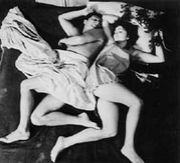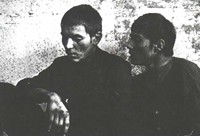開催終了『夜のダイヤモンド』上映会
詳細
2006年10月07日 23:24 更新
まだまだ『早春』の上映会は終わっていませんが、
次の中欧地下映画上映会の告知をいたします。
『夜のダイヤモンド』Demanty noci(1964年)
チェコ人ヤン・ニェメツJan Nemec監督
無料です
70分くらいの、ある意味「リアリスティック」な映画。
台詞はほとんどなく、映像そのものが語ってくれます。
例によって日本語字幕はないのでパンフを用意します。
場所は、ギャラリー「アーキペラゴ」
http://
2006年11月11日
15時と17時の二回。
予約制にするので、鑑賞ご希望の方は
私の方まで人数と時間をお知らせください。
何か変更があったら、下の欄でコメントします。
コメント(11)
2006年10月25日 22:54
<監督紹介>
ヤン・ニェメツ Jan Nemec。チェコ人映画監督。1936年、プラハ生まれ。1960年にプラハ映画学校卒業。
在学中は1940年代から1950年代にかけてチェコ映画界を牽引したヴァーツラフ・クルシュカ(Vaclav Krska)のもとで学んだ。
クルシュカは作家のスタイルと重視する教育者であった。ニェメツは初期の頃から、いわゆるリアリスティックな手法は用い
ず、アルノシュト・ルスティク(Arnost Lustig)の小説を映画化した『夜のダイヤモンド』Demanty noci(1964年)では、
ナチスの輸送列車から逃げるユダヤ人の青年達の、メンタリティーを描こうとした。その後、『愛の殉教者』(1966年)と
『宴会と客』1966年)を撮ったが、これらの脚本は両方ともエステル・クルンバホヴァーと共同で書いた。『宴会と客』は、
当局とのさまざまないさかいの末、結局1973年に「永遠に公開禁止」となり、ニェメツは1975年にチェコを出た。
<あらすじ>
二人のユダヤ人の少年が、収容所から収容所へと送られる貨車から、チェコの国境近くで脱走する。二人はプラハを目指して、
山の中を飲まず食わず逃げ続けるのだ。飢えと疲労でふらふらになった彼等は、途中ドイツ領の農家でどうにも我慢できずに
一片のパンを乞う。少年は密告を怖れてその農婦を撲殺使用と思うが結局は殺せない。だがそのために彼等はドイツの民間監
視隊に山狩りをされて捕まってしまう。もはや決してプラハに辿りつけなくなった彼等は、刻一刻命を刻まれる思いで最後の
断が下るのを待たされるのだ。(20頁)
<みどころ>
第一点は、この映画が記憶(過去)や願望(未来)など少年の想像上の体験を、現実(現在)の体験と全く同等のリアリティ
を持って混織しているところである。(…)
第二点は、その映像感覚、カメラ・ワーク、異様なイメージを創りだす演出力が抜群に優れていることである。(…)
第三点は、ほとんど度を越しているために、それが緊迫した表現にまで転じている禁欲的な音プランである。(21−22頁)
松本俊夫――映画評論、1966年12月号、チュコ映画「夜のダイヤモンド」について――より引用
2006年11月20日 21:09
『夜のダイヤモンド』追記
Screen: Focusing on the Outer Edge of Existence
By RENATA ADLER, HOWARD THOMPSON
Published: March 15, 1968
"DIAMONDS OF THE NIGHT," which opened yesterday at the Bleecker Street Cinema, is a realistic Czechoslovak film about two escapees from a German concentration camp; it makes one realize just how valid and necessary absurdism, particularly the austere absurdism of great dramatists like Beckett or even Pinter, is.
The two young men (played by Antonin Kumbera and Ladislav Jansky) run for a long time, and the handheld camera runs realistically with them—becoming dizzy when they tire, taking on their memories and hallucinations, ducking and hiding, and resting when they do. With one of them, it keeps removing a shapeless bandage to examine an injured foot. It shows the condition of their mouths when, after starving for many days, they try to eat a piece of bread. It shows them hounded and caught and released. For long stretches of the film there is no sound except their breathing, or church bells, or the ticking of a clock. It is all quite depressing and real, and when one sits through it all one feels one has accomplished something.
The problem is that it doesn't really work and that it probably cannot be done this way. If you want to convey monotony it has to be stylized; it cannot be lifted from life intact and conveyed on the screen. And for characters on the outer edge of existence, living an extreme of misery, realism is somehow inappropriate. One loses interest. It looks unreal. Two men running, one ceaselessly preoccupied with his foot, the other in a kind of trance, both hounded by a band of toothless German-speaking Czechoslovaks—in Beckett it would be stark and stylized to the point of ritual. The documentary spirit is too real to draw one in.
Jan Nemec, who directs, seems aware that when an artist is being deliberately dreary he must know exactly what he is doing. The movie, in its own slow time, is very carefully made. It is only that one becomes accustomed to its desperation very quickly — as eyes adjust to the dark — and then one finds one's way about too comfortably.
"Diamonds of the Night" was shown at the Czech Film Festival at the Museum of Modern Art earlier this year.
The titles that appear in this silent classic are extraordinary: "The Chaps Get Busy;" "Blow the Hooter." And the music, whose dramatic line is almost entirely divorced from anything that is going on in the story, leads a lunatic life of its own.
DIAMONDS OF THE NIGHT, screenplay by Jan Nemec and Arnost Luistig, from a story by Mr Lustig; directed by Mr. Nemec. A Caskoslovensky Film Production released by Impact Films. At the Bleecker Street Cinema, 144 Bleecker Street. Running time: 70 minutes.
First . . . . . Antonin Kumbera
Second . . . . . Ladislav Jansky
The Woman . . . . . Ilse Bisehofveva
- mixiユーザー
- ログインしてコメントしよう!
困ったときには




